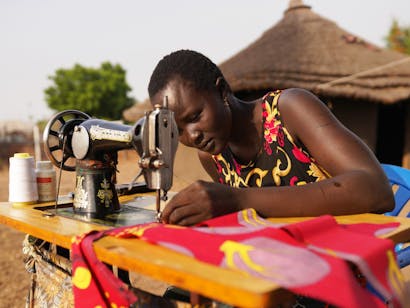Savings Groups: a Pathway to Peace?
How participation in Village and Savings and Loans Associations influences social cohesion in South Sudan
Ever since the start of the Addressing Root Causes programme, we had a hypothesis that CARE’s Village Savings and Loans Associations (VSLAs) might be strengthening social cohesion in many South Sudan communities. So, we commissioned a study to investigate this link.

Online event
On 24 June 2021 CARE presented the findings of this study that investigated how men and women’s participation in Village Savings and Loans Associations (VSLAs)¹ affects social cohesion in South Sudan, during an online event organized together with the Knowledge Platform Security and Rule of Law. The event was well attended by peer organizations, representatives of the Ministry of Foreign Affairs of the Netherlands and the Dutch Embassy in Juba.
¹ Village Savings and Loans Associations (VSLAs) are self-managed savings groups of individual members from within a community who regularly meet to save their money in a safe space and access small loans or insurance.
Main findings
CARE’s study found that even though VSLAs have primarily economic benefits for their members, they do indeed also improve peace and reduce conflict in and between different communities. As a result of their improved economic status gained through the VSLA, members are less inclined to engage in conflict. Women and young men especially see their role in the community changing as their economic empowerment grows, leading to a better-defined, more positive identity in the community and more harmonious relationships with those around them.
VSLAs contribute to social cohesion for two main reasons:
- Participating in a VSLA leads to higher self-awareness, confidence and a clear (new-found) identity as entrepreneur or leader.
- By minimising the drivers for conflict by improving economic status.

Other influencing factors
However, VSLAs alone cannot lead to increased social cohesion amongst the community. They must be combined with other interventions and operate in a relatively stable environment. When a very severe crisis–such as a flood–hits the entire community, then community members still require supplemental supports beyond what VSLAs can offer. Other complementary factors that need to be in place include: incorporating peacebuilding trainings, identifying shared income-generating activities (IGAs) with which to engage, finding safe spaces for interaction, and having complementary activities with other community groups.
Angeline Munzara, who reflected on the study from her experiences working for World Vision, stated that “…there’s glory for VSLAs, but there are other peacebuilding initiatives that have been layered onto the project for the groups to be successful.”
Many were triggered by the apparent effectiveness of including more young men in VSLAs. (I)NGOs that set up savings groups are mostly working with women at the moment, but it’s mostly the youth (specifically young men) that are involved in conflict. The participants concluded that in order for savings groups to contribute to social cohesion and peace building, organizations need to re-strategize about with whom they engage.
Concerns
There were also concerns about the use of VSLAs for social cohesion purposes. The most common concern was that the essence of what peacebuilding means might be lost by linking it to economic empowerment (and vice versa), and that it could result in neither being successful. Participants emphasized considerations such as:
If only certain groups are engaged in VSLAs this might create economic disparities in communities, which could in turn lead to (more) conflict.
Focussing on those with the most talent, skills, education through VSLA membership may leave more marginalized groups behind.
Consider the risk of reinforcing the message that individuals’ value or primary connection to others is through wealth/capital.
Women will become overburdened if they have to do IGAs on top of peacebuilding activities and their family/household responsibilities.

Recommendations
By the end of the event, the following recommendations for future programming and policy were made:
- Due to the self-selecting principle of savings groups, they are often not inclusive. To overcome that challenge, it is necessary to advocate for more diversification with group leaders.
- Develop formal TORs for VSLAs and ensure all sections of the community are able to join the VLSAs.
- Linking VSLAs with cash transfer programs or government social protection schemes to increase their impact.
- Push for women entrepreneurship funds at policy level through embassies.
- Be mindful of the time that it takes to build social cohesion and ensure donors buy-in from inception to allow more time to achieve greater positive outcome and impact.
Despite evidence that VSLAs may influence other types of outcomes such as peacebuilding or shifts in gender norms, we must not lose sight of what they do best: improve the financial well-being of their members. However, that doesn’t mean that we should be blind to the potential that these savings groups have for building bridges between people. Improving the well-being of people in fragile and conflict-affected settings requires approaches that are holistic and comprehensive, and cut across the divides between economic empowerment and peacebuilding.


